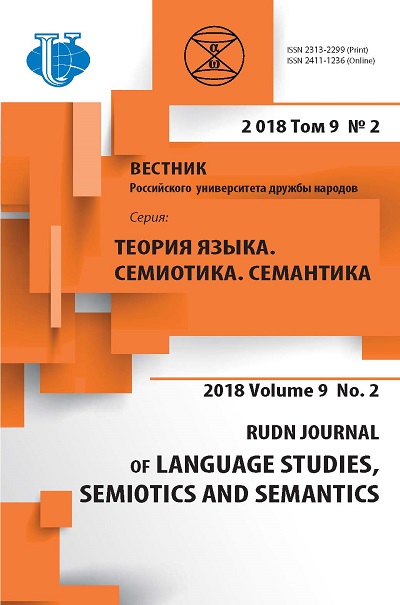EXPRESSING OF NATIONAL AND CULTURAL IDENTITY IN ENGLISH AND RUSSIAN PROVERBS
- Authors: Orlova T.G.1, Kolosova A.A.1, Medvedev Y.S.1, Barov S.A.1
-
Affiliations:
- RUDN University
- Issue: Vol 9, No 2 (2018)
- Pages: 320-334
- Section: Functional and Comparative semantics
- URL: https://journals.rudn.ru/semiotics-semantics/article/view/18746
- DOI: https://doi.org/10.22363/2313-2299-2018-9-2-320-334
- ID: 18746
Cite item
Full Text
Abstract
About the authors
Tatiana Gennadievna Orlova
RUDN University
Email: orlova_tg@mail.ru
Candidate of Philology, Associate Professor, the Department of Foreign Languages, Faculty of Humanities and Social Sciences, PFUR; scientific interests: comparative linguistics Miklukho-Maklaya st., 6, Moscow, Russia, 117198
Alevtina Aleksandrovna Kolosova
RUDN University
Email: kolosova_aa@mail.ru
Candidate of Historical Sciences, Associate Professor, the Department of Intercultural Communication, Faculty of Philology, PFUR; scientific interests: applied linguistics, intercultural communication Miklukho-Maklaya st., 6, Moscow, Russia, 117198
Yuri Sergeevich Medvedev
RUDN University
Email: medvedev_ys@mail.ru
Сandidate of Historical Sciences, Associate Professor, the Department of Foreign Languages, Faculty of Humanities and Social Sciences, PFUR; scientific interests: lingvocultorology Miklukho-Maklaya st., 6, Moscow, Russia, 117198
Sergey Andreevich Barov
RUDN University
Email: barov_sa@pfur.ru
Candidate of Political Sciences, Associate Professor, the Department of Foreign Languages, Faculty of Humanities and Social Sciences, PFUR; scientific interests: contrastive linguistics, linguocultorology Miklukho-Maklaya st., 6, Moscow, Russia, 117198
References
- Ayto, J. (2010). Oxford Dictionary of English Idioms (Oxford Quick Reference) 3rd Edition Oxford University Press.
- Cluski, J. (1971). A comparative book of English, French, German, Italian, Spanish and Russian proverbs with a Latin appendix/ comp. and ed. by Jerzy Cluski - Amsterdam; London, New York: Elsevier, XXXVIII.
- Dal', V.I. (20042007). Tolkovyj slovar' zhivogo velikorusskogo jazyka. Sovremennoe napisanie. 4 vol. M.: AST, Astrel'.
- Deutscher, G. Through the Language Glass: Why the World Looks Different in Other Languages, 2011, p. 9, 320 p.
- Doyle, Charles Clay The dictionary of modern proverbs / Comp. by Charles Clay Doyle, Wolfgang Mieder, and Fred R. Shapiro - New Haven; London: Yale university press, cop. 2012 - XIV, 294 p.
- Dubrovskaya, O.G. Russian and English proverbs as culturological units. Tyumen, 2002, p. 148.
- Flavell Linda and Roger Dictionary of proverbs: and their origins / Linda and Roger Flavell. London: Kyle Cathie, 2008, 280 p.
- Honeck, R.P. A proverb in mind: The cognitive science of proverbial wit and wisdom. Mahwah, NJ: Erlbaum, 1997, 318 p.
- Ivanova, E.V. Mir v anglijskikh i russkikh poslovitsakh: Uchebnoe posobie [World in English and Russian proverbs: Textbook]. SPb.: ed. St. Petersburg State University, 2006, p. 3, 280 p.
- Jackson, А.L. The dynamics ofproverbial sayings: discover the connections within / by Lorenzo A. Jackson. Great Britain: Lorenzo A. Jackson, 2011, 360 p.
- Hofstede, Geert H. Cultures and Organizations: Software of the Mind: Inter cultural Cooperation and its importance for Survival (by Geert, Hofstedе, Gert Jan Hofstede and Michael Minkov. 3rd ed. N.Y: McGraw-Hill, 2010, p.61, 576 p.
- Kotova, M. Russko-slavianskii slovar' poslovits s angliiskimi sootvetstviiami [Russian-Slavic dictionary of proverbs with their English equivalents]. Saint Petersburg, University Publ., 2000, p. 22, 360 p.
- Kramsch, C. Language and Culture (Oxford Introductions to Language Study). Oxford: Oxford University Press, 1998, p. 3, 134 p.
- Manser, Martin H. The Facts on File dictionary of proverbs / Manser: accociate editor, Rosalind Fegusson. Martin H. Manser NewYork; [Great Britain]: Favts on File, 2002, 440 p.
- Margulis, А., & Kholodnaya, A. Russian-English Dictionary of Proverbs and Sayings North Carolina: McFarland, 2008, 495 p.
- Mieder, W. Proverbs. Handbook. Westport & Connecticut & London, Greenwood Publishing Group, 2004 (reprinted 2011), 304 p.
- Mieder, W. Tradition and Innovation in Folk Literature. Routledge, 2015, p. 1, 304 p.
- Friedman, M., Chen, H.-Ch., & Jyotsna Vaid, Jy. Proverb preferences across cultures: Dialecticality or poeticality? Psychonomic Bulletin & Review, 2006, 13 (2), pp. 353-359.
- Permjakov, G.L. Osnovy strukturnoj pareomiologii. M.: Nauka, 1988, p. 16, 236 p.
- “Proverbs Speak Louder Than Words”: Folk Wisdom in Art, Culture, Folklore, History, Literature and Mass Media (2008). N.Y.: Peter Lang Inc., International Academic Publishers, 2008, pp. 9-10, 357 p.
- Sergeeva, A.V. Russkie: stereotipy povedenija, tradicii, mental'nost'. M.: Flinta: Nauka, 2010, 320 р.
- Shatskaya, E.Y. Tematicheskij slovar' russkikh i anglijskikh poslovits i pogovorok [Thematic Dictionary of Russian and English proverbs and sayings]. Publisher “Pero”, Moscow, 2013, 157 р.
- Slovar' upotrebitel'nykh poslovits [Glossary of commonly used proverbs] / M.V. Bukovskaya, S.I. Vyal'tseva, Z.I. Dubyanskaya i dr. Moscow, Russian language, 1990, 234 p.
- Speake, J. The Oxford Dictionary of Proverbs. Oxford University Press, 2015, 416 p.
- Telia, V.N. Russian phraseology: semantic, pragmatic and linguistic-cultural aspects. M., 1996, p. 249.
- Zhukov, V.P. Slovar' russkikh poslovits i pogovorok [Dictionary Russian proverbs and sayings]. M., 1990, 537 p.
Supplementary files












